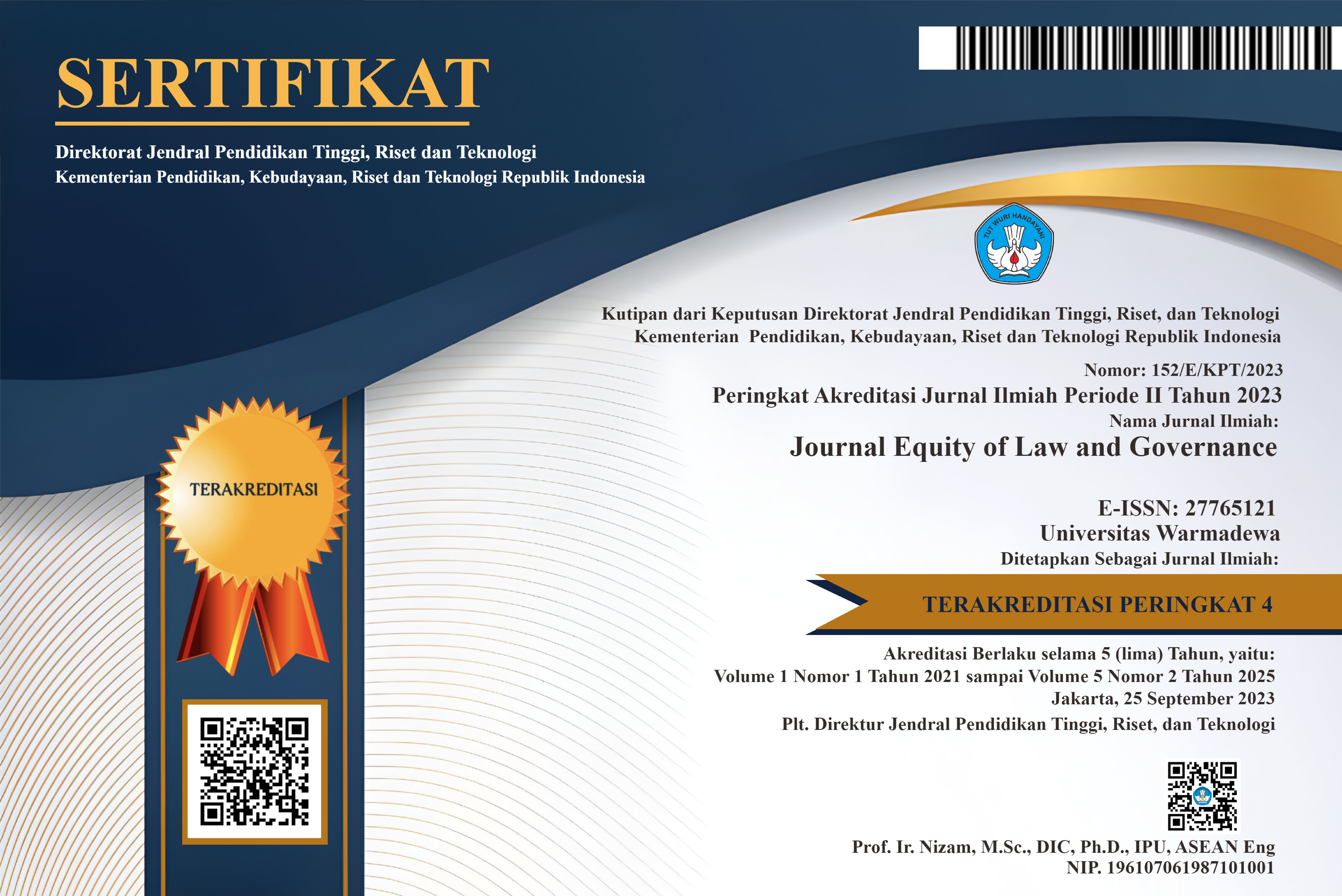Protection of Workers' Legal Rights Against Unilateral Termination of Employment (Analysis of Decisions 83/Pdt.Sus-PHI/2020/PN.Mdn and 105/Pdt.Sus-PHI/2021/PN.Mdn)
Abstract
Employees and workers may be fired by a firm as long as it complies with the procedures and requirements outlined in the Manpower Law. But it is not acceptable to fire a worker or employee arbitrarily or for not following the correct procedure. This work is normative juridical legal research with analytical descriptive research features. Legal papers gathered through literature review procedures, classified as primary, secondary, and tertiary, make up the secondary data that is employed. Techniques from qualitative analysis were used in the data analysis process. Although the Manpower Law enables unilateral the termination of employment (PHK) due to efficiency and business closure, based on reduced productivity, is allowed under Law No. 6/2023, often known as The Regulations on the creation of work. This law permits layoffs without necessitating the company's closure. As per the terms of legislation 6/2023, the Creation of Industries Act, layoffs are outside the jurisdiction of the Industrial Relations Court (PHI). The Termination of Finding work, however (PHK) process under the Manpower Law requires direct negotiation between the employer and employee. The panel of judges examined the legislation in Decision Numbers 83/Pdt.Sus-PHI/2020/PNMdn and 105/Pdt.Sus-PHI/2021/PNMdn with the aim of safeguarding the rights of employees who were terminated unjustifiably. This entailed bestowing upon the plaintiff the rights specified by the Labor Law. Although the judge did not take into account the Job Creation Law (Law No. 2/2020) that was in existence at the time, it is believed that the verdict adequately safeguards the rights and provides legal protection of employees who were fired without cause.
References
Aponno, Axcel Deyong, (2021), Pemutusan Hubungan Kerja Secara Sepihak Berdasarkan UU Cipta Kerja (Studi Kasus PT. Indosat TBK), Jurnal Kertha Semaya, Vol. 9 No. 10 Tahun 2021.
Bambar, Atanasio Trivaldus, (2022), Pemutusan Hubungan Kerja Secara Sepihak menurut Undang-Undang Ketenagakerjaan, JIIP (Jurnal Ilmiah Ilmu Pendidikan) Volume 5, Nomor 6, Juni 2022.
Erni Dwita Silambi, (2014), Pemutusan Hubungan Kerja Ditinjau Dari Segi Hukum ( Studi Kasus PT. Medco Lestari Papua), Artikel, tersedia di https://media.neliti.com/media/publications/42654-ID-pemutusan-hubungan-kerja-ditinjau-dari-segi-hukum-studi-kasus-ptmedco-lestari-pa.pdf, diakses tanggal 25 April 2014.
Fuady, Munir, (2007), Dinamika Teori Hukum, Jakarta: Ghalia mania Indonesia, 2007.
Gulo, Feby Egatri, (2024), Perlindungan Hukum Terhadap Tenaga Kerja Dalam Pemutusan Hubungan Kerja Secara Sepihak, Jurnal Kertha Semaya, Vol. 12 No. 4 Tahun 2024.
Hendrik, (2023), Pelindungan Hukum Terhadap Tenaga Kerja Yang Mengalami Pemutusan Hubungan Kerja Sepihak Pasca Terbitnya Undang-Undang Nomor 11 Tahun 2020 tentang Cipta kerja, Jurnal Ilmiah Global Education 4 (3) Tahun 2023.
Jahari, Akis, (2023), Perlindungan Hukum Terhadap Pekerja Akibat Pemutusan Hubungan Kerja Tanpa Pesangon Berdasarkan Undang-Undang Nomor 13 Tahun 2003 dan Peraturan Pemerintah Pengganti Undang-Undang Nomor 2 Tahun 2022 Tentang Cipta Kerja, Case law – Journal of law Vol . 4 No . 2 Juli 2023.
Joka, M. Rikhardus dan Maria GS Sutopo, (2018), Aspek Yuridis Pemutusan Hubungan Kerja (PHK) Dalam Mewujudkan Hukum Ketenagakerjaan Berbasis Keadilan, Binamulia Hukum Vol. 7 No. 2, Desember 2018.
Khakim, Abdul. (2014). Dasar-Dasar Hukum Ketenagakerjaan Indonesia. Jakarta: Citra Aditya Bakti.
Khairi, Mawardi, Perlindungan Hak-Hak Buruh Yang Mendapatkan Pemutusan Hubungan Kerja (PHK) Oleh Perusahaan Pada Masa Pandemi Covid-19, Pakuan Justice Journal Of Law Volume 02, Nomor 02, Juli-Desember 2021.
Nasution, Bahder Johan, (2014), Kajian Filosofis tentang Konsep Keadilan Dari Pemikiran Klasik Sampai Pemikiran Modern, Yustisia Vol. 3 No.2 Mei - Agustus 2014.
Putra, Andika Pramana, (2021), “Kajian Hukum Terhadap Putusan Mahkamah Agung Atas Perkara No 825 K/PDT.SUS-PHI/2015 Tentang Pemutusan Hubungan Kerja Karena Alasan Efisiensi”, Jurnal Hukum Adigama, Volume 1, Nomor 1, 2021.
Putri, Kerenhapukh Milka Tarmadi dan Gunardi Lie, (2023), Pengaruh Kebijakan Efisiensi Sebagai Alasan Penjatuhan Phk: Perbandingan Antara Undang-Undang Ketenagakerjaan Dan Undang-Undang Cipta Kerja, Syntax Literate: Jurnal Ilmiah Indonesia, Vol. 8, No. 11, November 2023.
Suwantari, I Gusti Ayu Dewi, Perlindungan Hukum Terhadap Para Pekerja Yang Mengalami Pemutusan Hubungan Kerja Karena Dampak Digitalisasi, Jurnal Kerta Semaya Vol. 6 No. 7 Tahun 2018.
Thamrin. (2019). Perlindungan Hukum Tenaga Kerja Indonesia. Pekanbaru: Alaf Riau Pekanbaru.
Tumeleng, Elisa K.S. Perlindungan Hukum Terhadap Pekerja Atas Tindakan Pemutusan Hubungan Kerja (PHK) Yang Dilakukan Secara Sepihak Di PT. Bangun Wenang Baverages Company (BWBC), Universitas Atma Jaya Yogyakarta 2017, dilihat di https://e-journal.uajy.ac.id/12352/1/JURNAL%20HK10226.pdf, diakses pada tanggal 27 Desember 2023.
Widiastiani, Nindry Sulistya, (2021) Justifikasi Pemutusan Hubungan Kerja Karena Efisiensi Masa Pandemi Covid-19 dan Relevansinya dengan Putusan Mahkamah Konstitusi Nomor 19/PUU-IX/2011, Jurnal Konstitusi, Volume 18, Nomor 2, Juni 2021.
 Abstract viewed = 40 times
Abstract viewed = 40 times
 PDF downloaded = 43 times
PDF downloaded = 43 times













